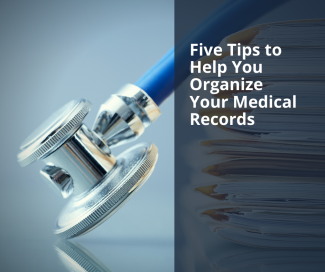
Five Tips to Help You Organize Your Medical Records
If your medical records are scattered across a mishmash of different providers, cities, or even states, you may have trouble creating a comprehensive medical history when you need one. What steps can you take now to organize your medical records and make them easier to access?
Locate and Compile Your Medical Records
Beginning with your current doctor, request copies of your medical records. If you remember the names and contact information for prior health care providers, contact them directly as well. Otherwise, you may be able to request past records through your current physician by filling out a medical release form. By having as many of your medical records as possible at the outset, the process of creating your personal health record should be a smoother one.
Create a Medical Timeline
Depending on the specifics of your medical history, it may make sense to organize this information by category, chronology, or both. For those with autoimmune disorders, setting out a chronological history of your health conditions and treatments shows the progression of the ailment and provides your physician with a more complete picture when they're recommending further treatment. Meanwhile, by having all your records relating to a specific condition in one place, they're not missing anything when advising you.
This medical timeline may include information on prior doctor's visits, test or procedure results, immunization records, cancer screenings, a list of allergies or drug sensitivities, and your family health history (usually limited to your parents, grandparents, and siblings).
List Your Medications and Supplements
Make a list of all the medications (prescription or over-the-counter) you're taking right now, including information on the dosage, the date you began taking it, and the condition it's intended to treat. Leave space to list any side effects you experience. This may be important information for your doctor to know when evaluating whether you need to continue with this medication or switch to another. And because some over-the-counter supplements interfere with the effectiveness of certain birth control medications, antibiotics, and other drugs, it's a good idea to list them too.
Gather Bills, EOBs, and Insurance Documents
Though gathering past medical bills may seem like a tedious task, having your explanations of benefits (EOBs) on hand can come in handy if you need to dispute a bill or seek preapproval for a certain medical expense. Keep these EOBs on hand, along with any paid bills. If you'd like to reduce paper clutter, scan them to a cloud folder so you'll have them if you need them.
List Your Important Contacts
In an emergency, you might not be able to provide paramedics with key medical information. Keep a list of your healthcare providers' names and contact information, along with one or two emergency contacts and your health insurance information. Some smartphones even allow you to program this information under an emergency contact listing, giving access to someone who comes to your aid without providing access to the other password-protected parts of your phone.
LPL Tracking #1-05176094




